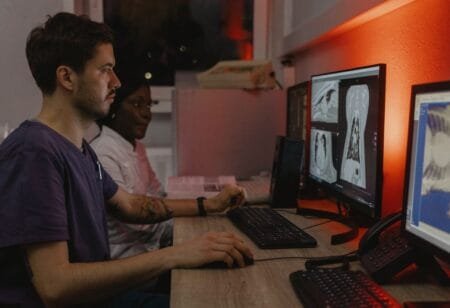On 24 June, the European Commission adopted the Communication, ‘Action Against Cancer: European Partnership’, to support the Member States in their efforts to tackle this major health challenge. One of the four proposed areas for action within this Partnership is the coordination of cancer research. This background note provides further information on the European Union’s commitment to cancer research and its coordination in Europe.
Advertisement
How is cancer research supported by the EU?
Health is one of the priority areas of the European Commission’s funding programme for research, the ‘Framework Programme’. Within this framework, cancer research has been specifically and significantly supported.
In the Sixth Framework Programme (FP6, 2002-2006), the ‘Combating Cancer’ initiative resulted in the allocation of approximately 480 million to 108 transnational cancer research projects all over Europe.
And already 265 million have been devoted to cancer research in the current Seventh Framework Programme (FP7, 2007-2013), supporting 65 projects and over 700 research groups. Approximately one third of this budget was spent on large transnational projects addressing complex issues which require a combination of resources and capacities.
A further 100 million is expected to be awarded for cancer research through a new call for proposals that will be published in July 2009.
It is also planned that additional calls for proposals addressing cancer research will be published in the coming years.
How does the EU contribute to the coordination of cancer research in Europe?
As mentioned in the Communication, ‘Action Against Cancer: European Partnership’ , the European cancer research field is characterised by its fragmentation and its diversity (multiplicity of support mechanisms, funding bodies, etc). Consequently, one of the EU’s key policy objectives for the proposed Partnership is to improve the coordination of cancer research activities throughout Europe. This is in line with the objectives of the European Research Area (ERA) which endeavours to bring together EU, national and regional research programmes, activities and policies.
In FP6, the Commission already actively pursued the coordination of cancer research by funding the EUROCAN+ PLUS ( http://www.eurocanplus.org/ ) project. This action originated from a specific request of the European Parliament to assess how national cancer research activities could be better coordinated. Launched in 2004, the project brought together most of the major cancer research institutes in Europe (Karolinska Institute, Institute Gustave Roussy, Instituto Europeo di Oncologia, etc), some ministries and several foundations (Danish Cancer Foundation, etc).
The recommendations of the EUROCAN+PLUS project have been taken up in FP7 to help establish a strong, harmonised collaborative framework for cancer research in Europe. With a budget of approximately 5 million, 5 actions have been launched in this spirit. For instance, the EUROCOURSE project tackles fragmentation in the funding and usage of cancer registries in Europe, while the OPCARE9 and PRISMA actions focus on integrating knowledge and practice of end-of-life care.
To further strengthen the coordination of cancer research in Europe, the European Commission will shortly launch a new call for proposals for the establishing of an ERA-Net on translational cancer research in Europe. ERA-Nets, whose name refers to the European Research Area and to Networking, are designed to coordinate the activities of national and regional research funding organisations.
Which areas are covered by EU-funded cancer research?
– Causes and mechanisms underlying cancer
Although recent years have witnessed significant progress in understanding the transformation of a normal cell into a cancer cell, a lot remains to be discovered. The EU is committed to research on the causes and mechanisms underlying cancer, covering a wide range of topics, from the molecular causes of cancer to its development and progression, through to molecular mechanisms relevant to the discovery of new drug candidates.
The recently funded GENICA project, which addresses the mechanisms leading to the instability of the genome in cancer, could help identify novel cellular targets for cancer therapy. The project involves 11 partners from the following 8 countries: Switzerland, Finland, Denmark, Spain, Italy, Greece, United Kingdom and France. Another example of a successful EU-funded project is ONCODEATH, whose objective is to identify components conferring sensitivity or resistance to tumour cell death. The results of this project funded under FP6 could be put into practice in clinics in the near future.
– Cancer treatment and palliative care
One of the main objectives of EU-funded cancer research is to find better treatment with minimal side effects. The EU encourages the development of guidelines for good clinical practice and the translation of existing research results into concrete applications. As a consequence, EU funds support clinical research aimed at validating new and improved interventions as well as translational research aimed at bringing basic knowledge through to applications in clinical practice and public health. Moreover EU-funded cancer research addresses treatment resistance, side effects of cancer therapy and palliative care.
An example of a n EU-supported project to improve treatment is TRANSBIG , a research network of 40 world-class institutions in 22 countries. This high-level collaboration will contribute to advancing individualised treatment for breast cancer patients. In 2007 TRANSBIG started the clinical trial called MINDACT to compare the traditional method of assessing a tumour’s aggressiveness with a new method called the 70-gene prognostic signature. The results of MINDACT will allow improved tailoring of chemotherapy in breast cancer.
– Risk factors and cancer prevention
Under the Seventh Framework Programme, more than 27 million so far have been devoted to research focusing on risk-factors and prevention. Indeed, understanding the role of nutritional, genetic, environmental and socio-economic factors involved in cancer could help predict the risk of certain cancers and prevent their occurrence.
For example, the MOBI-KIDS project assesses potential carcinogenic effects of exposure to radio-frequency fields in childhood and adolescence, while the ESCAPE project analyses the impacts of long-term exposure to air pollution on cancer incidence and mortality.
Who participates in cancer research projects funded by the EU?
Participants in the multidisciplinary projects supported by the EU come from many types of organisation: leading research universities and institutes, university hospitals, and small and medium-sized enterprises (SMEs) as well as larger industrial companies.
The European Commission (EC) strongly encourages the collaboration with the private sector in the field of research. Recently, the EC and the pharmaceutical industry set up a joint initiative to support the faster discovery and development of better medicines for patients: the Innovative Medicines Initiative (IMI). Cancer research is well represented in the scientific priorities of this unique Public-Private Partnership which has a budget of 2 billion for the period up to 2013.
Further information:
General information on EU research:
General information on EU Health research in FP7:
Combating Cancer initiative in FP6:
All the abstracts of cancer research projects funded in FP6
Information about the draft scientific priorities for IMI
Source: European Commission






